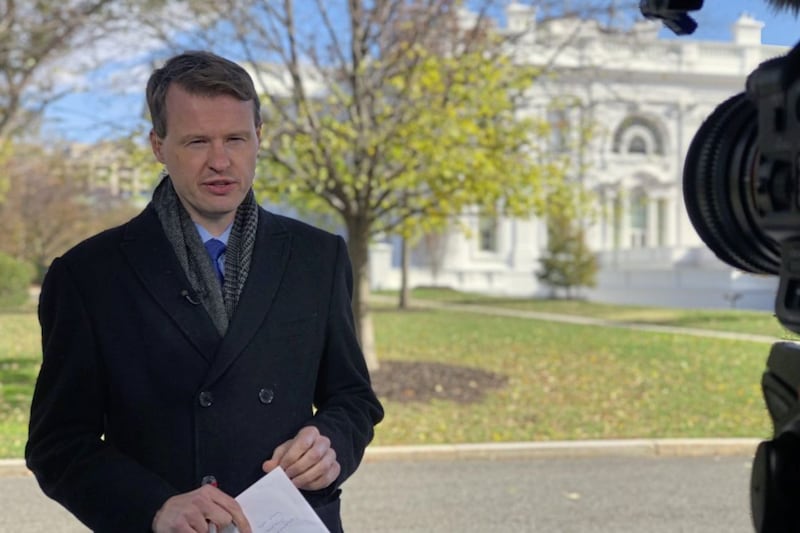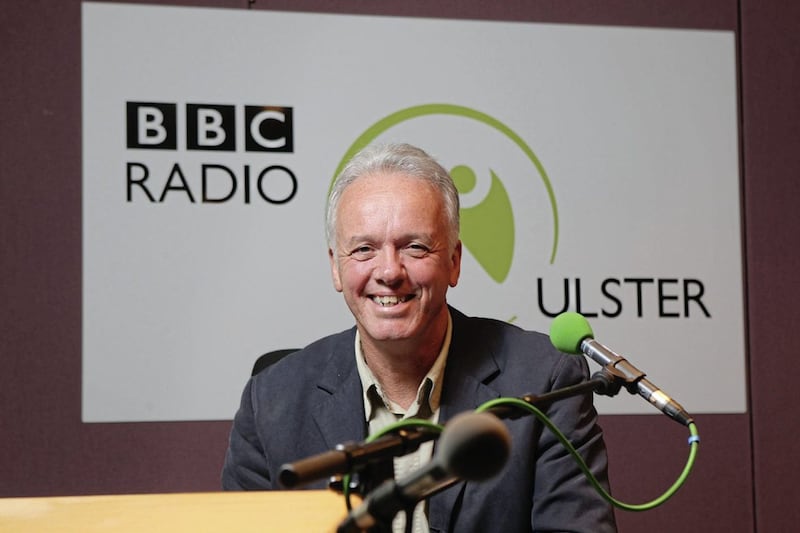MANY of us wake up to Noel Thompson’s voice four mornings a week and whether he’s grilling a politician about their party’s latest gaffe or he’s trying to coax some gems out of a nervous schoolchild, he’s never less than engaging.
Thompson's professional cynicism, pithy turn of phrase and hearty chuckle are all part of his trademark on-air persona for Radio Ulster on its flagship news programme Good Morning Ulster.
But in real life – that is, off the telly and away from our radios – he is a man with a compassionate heart who’s not afraid to show his emotions or to have a good laugh at himself, as well as others.
The east Belfast born and bred broadcaster also has a love of the arts, the outdoors – mostly from hiking in the Mournes – and adventure, particularly wildlife. If he hadn’t enjoyed a series of "fortunate" incidents which led into a career that spans 37 years as a BBC journalist, he might well have spent his days working as a wildlife photographer. (Though some may say that his years working at the core of BBC NI’s coverage on the last years of the Troubles were wild enough for anyone.)
Asked about his ‘worst of times, best of times’, Thompson replies with a standard ‘The best is yet to come’ mildly sarcastic reply while laughing his head off as we chat at his home which he shares with Sharon, his wife of 35 years.
As he has just come off the morning show, he’s due a well-earned nap after rising at 4.30am to present that day’s news.
Thompson is open enough to say that he believes that journalists like him may suffer from a form of PTSD (Post Traumatic Stress Disorder), in the aftermath of the daily grind of reporting on one atrocity after another during the Troubles.
Although the 61-year-old has never believed that he needed help with dealing with it, he acknowledges that every journalist of his experience has stories of incidents which have stayed with them, long after the headlines have stopped.
The two incidents that count for Thompson’s worst of times in the job are the UVF fire-bombing of the house of the young Quinn brothers on July 12 1998 and the funerals of the 29 men and women, along with two unborn children, who were killed in the Omagh Real IRA bombing on August 15 that year, 13 weeks after the signing of the Good Friday Agreement.
“I was covering a special programme on the Omagh funerals and there were nine of them in one day,” recalls Thompson who got his lucky break in broadcasting in 1979 as a regional researcher on the Nationwide programme.
“I remember talking to people and wondering to myself, ‘What do you say to this? What can you possibly say on a day like this to make anyone understand or feel or realise what has happened, the sheer enormity of the tragedy?’
“I think that for all of us journalists who covered this stuff, I think there is a little bit of post-traumatic stress, though I don’t think I’ve ever said that before as you just do it, you get on with the job. When I think all the people that were lost or injured,” he adds, shaking his head, “It was our job. I find it that sometimes I only have to think about it, to feel emotional about it. That’s a kind of post traumatic stress disorder, I think.”
Thompson anchored the BBC’s main evening news programme Newsline, previously known as Inside Ulster, for more than 20 years during the worst days of the Troubles.
Although he gives an emphatic “No” when he’s asked if it ever impacted on his ability to broadcast, he does recall a moment when his editor asked Wendy Austin to see if he was OK.
“It was rare for anyone to say, 'Are you OK?' because the next day brought another bloody disaster and we just had to go and do it all over again,” he admits. “ And I never thought myself to ask another colleague; we just went on and did it.
“As journalists, all of us, we were at the very cutting edge of our society tearing itself apart. Our job was to try and make sense of it all on a day to day basis.”
As a father of two adults sons, Mathew (29), a producer on Newsnight and Patrick (24), who works for the Halo Trust in Ukraine clearing landmines, he recalls his horror at finding out that the fire which claimed the lives of three young Quinn brothers was deliberate.
“I was on Good Morning Ulster that Sunday, reporting about this tragic fire and suddenly it was a murder inquiry. I interviewed loads of people about it at the time, all condemning it, but I remember Monica McWilliams simply saying, 'Go home to your families'. That struck a chord.”
Some of his ‘best of times’ include spending 10 hours a day live broadcasting during elections when he had barely time to have a comfort break.
“I just loved elections as there was always history being made, no matter what the results. I loved being on air for all those hours, the constant stream of people coming into the studio, keeping up with all the developments,” he adds.
A Cambridge graduate, Thompson became a ‘lifer’ in the BBC after he moved on from Nationwide into the corporation’s journalist training scheme, working in Manchester, London and Bristol before becoming a regional journalist in Belfast.
His lucky break came when Sean Rafferty became ill and Thompson was asked to be the lead presenter on Inside Ulster in 1987. Despite being terrified, he did a great job and his presenting led to working on UK-wide programmes such as Newsnight and BBC Breakfast.
While he also hosted Hearts and Minds for 17 years and still occasionally presents the BBC News Channel’s HARDtalk programme, there is a real sense of longing when he talks about the job that got away.
“I would love to present Desert Island Discs, that wonderful programme that combines talking to people and music,” he replies wistfully and adds how he also would have liked to have been the BBC’s Washington correspondent.
Thompson’s love of music is well-documented and he was been a baritone with the Belfast Philharmonic for about 35 years. He describes as accompanying the Ulster Orchestra as “the most exciting thing you can think of”.
A late student to the piano, having starting to play at the age of 50, he says he couldn’t imagine his life without music, but it’s the call of the wild that sends his pulse racing these days.
“Photography is my big passion at the moment and I’ve been on safari several times this year,” he adds. "I think I could spend my entire life driving around in a 4X4 taking photographs of wild animals. It’s so exciting when you are standing there in the early morning as the sun rises, with the wind in your face and then a bloody big lion appears from nowhere, and it’s like 'Aggh'.
“It’s the most exciting thing ever.”
:: Noel Thompson can be heard on Radio Ulster’s Good Morning Ulster from 6.30-9am Monday to Thursday.








